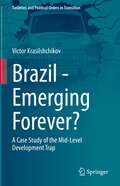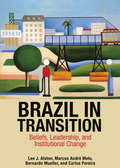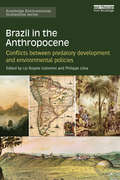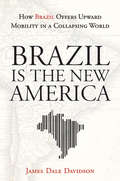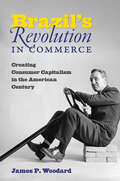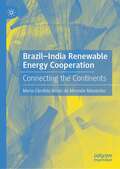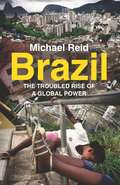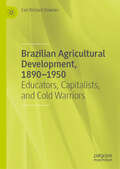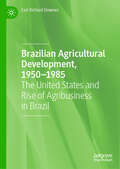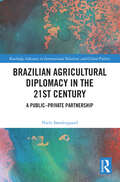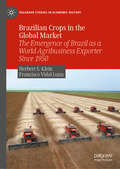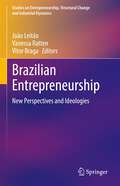- Table View
- List View
Brazen: The sensational memoir from the star of Netflix's My Unorthodox Life
by Julia HaartFrom the star of Netflix's My Unorthodox Life, a riveting, inspiring memoir. Julia Haart tells the story of her extraordinary journey, from leaving an ultra-Orthodox Jewish community to her rise from housewife to shoe designer, to CEO and co-owner of the modelling agency Elite World Group.'An irresistible read . . . Written with great intensity and rare candor, Brazen is a story of longing for more and manifesting that vision.' TOMMY HILFIGER'I congratulate Haart on the show and book, both of which I enjoyed ... Haart is a hustler, a born entrepreneur, charismatic enough to attract investment like a pop ingenue attracts talent scouts, a "fighter" (her words) and a woman who loves and understands fashion.' POLLY VERNON, THE TIMES MAGAZINEEver since she was a child, every aspect of Julia Haart's life - what she wore, what she ate, what she thought - was controlled by the rules of ultra-Orthodox Judaism. At nineteen, after a lifetime spent caring for her seven younger siblings, she was married off to a man she barely knew. For the next twenty-three years, her marriage would rule her life.Eventually, when Haart's youngest daughter, Miriam, started to innocently question why she wasn't allowed to sing in public, run in shorts, or ride a bike without being covered from neck to knee, Haart reached a breaking point. She knew that if she didn't find a way to leave, her daughters would be forced into the same unending servitude.So Haart created a double life. In the ultra- Orthodox world, clothing has one purpose - to cover the body, head to toe - and giving any more thought than that to one's appearance is considered sinful, an affront to God. But when no one was looking, Haart would pour over fashion magazines and sketch designs for the clothes she dreamed about wearing in the world beyond her Orthodox suburb. She started preparing for her escape by educating herself and creating a 'freedom' fund. At the age of forty-two, she finally mustered the courage to flee.Within a week of her escape, Haart founded a shoe brand, and within nine months, she was at Paris Fashion Week. Just a few years later, she was named creative director of La Perla. Soon she would become co-owner and CEO of Elite World Group and one of the most powerful people in fashion. Along the way, her four children - Batsheva, Shlomo, Miriam and Aron - have not only accepted but embraced her transformation.Propulsive and unforgettable, Haart's story is the journey from a world of 'no' to a world of 'yes', and an inspiration for women everywhere to find their freedom, their purpose and their voice.'Julia lives her life with an exhilarating fervour that's contagious to anyone lucky enough to be around her. Never willing to accept the status quo, time and again she has fought for her place in the world and demanded her seat at the table. I'm incredibly inspired by her stories, which are always told with honesty and heart. This book is a must read!'COCO ROCHA'Julia Haart is a hustler. Her story is an inspiring, believe-in-your-dreams, never-give-up, anything-in-life-is-possible story of hope. Run, don't walk, to get this book!'LISA RINNA
Brazil - Emerging Forever?: A Case Study of the Mid-Level Development Trap (Societies and Political Orders in Transition)
by Victor KrasilshchikovThis book discusses the social and economic problems currently faced by Brazil as one of the largest “emerging countries”. It examines the prospects of Brazilian development from an interdisciplinary perspective, and studies both socio-economic and political variables. The book embraces the large period of Brazil's development in the 20th and the first decades of the 21st Century. The peculiar attention is drawn to the short period of prosperity under the left-centrist governments as a continuation of the previous conservative modernisation model, which produced an increased dependency on China and a premature deindustrialisation of the economy. Assessing Brazilian statistics on households’ incomes and consumption, the book subsequently discusses the lack of strong social actors as the main problem in today’s Brazil. In closing, it examines probable scenarios for the country’s development and compares the situation to other “emerging countries”, including the Asian giants, China and India. The book addresses the needs of researchers in the fields of political science, economics and sociology who are seeking a better understanding of emerging countries, and the Brazilian case in particular.
Brazil 2003: Inflation Targeting and Debt Dynamics
by Laura Alfaro Rafael Di Tella Ingrid VogelIn October 2002, Brazilians elected a left-wing president, Luis Inacio Lula da Silva, for the first time in that country's history. As markets faltered in response, Lula sought to reaffirm his commitment to fiscal discipline, a floating exchange rate, and inflation targeting. By August 2003, however, his attempt to change market sentiment was threatened as the country faced a looming recession. Skeptics began to worry that the new PT (Worker's Party) government would be forced to resort to printing money to meet its campaign promises. Furthermore, after Argentina's massive default on its public debt at the end of 2001, observers were questioning the sustainability of Brazil's debt situation. Lula was under intense pressure to deliver results immediately and implement measures that would help spur the economy.
Brazil Sugar and the WTO: Agricultural Reform in the European Union
by Kerry Herman Ray A. Goldberg Irina TarsisBrazil's secretary of trade and production for the Ministry of Agriculture, Pedro de Camargo Neto, has won a WTO sugar decision for Brazil against the EU sugar policies. Analyzes what this decision will mean to world food policies, especially those of the EU and the United States. The ruling strengthens the WTO as a decision maker with respect to fair trade policy. The issue is what actions will the various private and public decision makers now take to make this ruling work and not put too big a burden on any one segment of the economy.
Brazil Under Lula: Off the Yellow BRIC Road
by Aldo MusacchioCovers President Lula's challenges to reduce "Brazil cost" and grow like other BRIC countries (Brazil, Russia, India, and China). Experts agreed that for Brazil to grow like other BRIC countries, the Brazilian government would have to reduce the cost of doing business in the country ("Brazil cost"). At the same time, President Lula's challenge is to develop programs that accelerate growth without undermining the progress achieved in reducing inequality and poverty. Can the Brazilian government reverse inequality and grow at the same time? What development strategy should Lula follow in his second term? Does Brazil belong in BRIC? What do these countries have in common?
Brazil at the Wheel
by Geoffrey G. JonesTaught in the second-year MBA elective on the Evolution of Global Business. Examines the costs and benefits of the Brazilian government's policies to encourage foreign multinationals to develop an automobile industry during the 1950s. A combination of incentives and market closure were used to attract foreign direct investment. Volkswagen responded more positively than the U.S. firms Ford and GM and was able to become market leader as a result.
Brazil in Transition: Beliefs, Leadership, and Institutional Change
by Lee J. Alston Carlos Pereira Bernardo Mueller Marcus André MeloBrazil is the world's sixth-largest economy, and for the first three-quarters of the twentieth century was one of the fastest-growing countries in the world. While the country underwent two decades of unrelenting decline from 1975 to 1994, the economy has rebounded dramatically. How did this nation become an emerging power? Brazil in Transition looks at the factors behind why this particular country has successfully progressed up the economic development ladder. The authors examine the roles of beliefs, leadership, and institutions in the elusive, critical transition to sustainable development. Analyzing the last fifty years of Brazil's history, the authors explain how the nation's beliefs, centered on social inclusion yet bound by orthodox economic policies, led to institutions that altered economic, political, and social outcomes. Brazil's growth and inflation became less variable, the rule of law strengthened, politics became more open and competitive, and poverty and inequality declined. While these changes have led to a remarkable economic transformation, there have also been economic distortions and inefficiencies that the authors argue are part of the development process. Brazil in Transition demonstrates how a dynamic nation seized windows of opportunity to become a more equal, prosperous, and rules-based society.
Brazil in the Anthropocene: Conflicts between predatory development and environmental policies (Routledge Environmental Humanities)
by Liz-Rejane Issberner Philippe LénaBrazil is considered one of the world’s most important environmental powers. With a continental territory containing almost 70 per cent of the Amazon rainforest, along with a rich biodiversity and huge amount of natural resources, its geopolitical role in environmental decisions is crucial to ongoing global negotiations surrounding climate change. Development policies based on extraction and exportation of raw materials by the mining and agribusiness sectors threaten the global environmental balance and the long-term sustainability of Brazil’s economy. Brazil in the Anthropocene examines Brazil's role within the global ecological crisis and considers how national and international policy is influenced by the interdependence of social, political, ethical, scientific and economic factors in the modern age. With chapters from a diverse range of international scholars this interdisciplinary volume will be of great interest to students and scholars of environmental politics, environmental sociology and the environmental humanities.
Brazil is the New America
by James Dale DavidsonLook to Brazil for safe, stable investments As the future of the American economy seems to get bleaker by the day, it is tempting to look abroad for business opportunities. Europe and Asia don't provide much hope, but what about somewhere that's both closer to home and sunny year-round? In Brazil is the New America: How Brazil Offers Upward Mobility in a Collapsing World, James D. Davidson shows that the current financial situation in Brazil is a haven for those looking to make money in a world in turmoil. With a population just 62 percent the size of that of the US, Brazil has added 15,023,633 jobs over the past eight years, while the US has lost millions. In a world burdened by bankrupt governments and aging populations, Brazil is solvent, with two people of working age for every dependent. In a world of "Peak Oil" Brazil is energy independent, with 70 billion barrels of oil, 60% of the world's unused arable land, and 15% of its fresh water. Comparatively non-leveraged--and with significant room for growth and expansion, as well as vast natural resources, Brazil is a haven of opportunity. Written by James D. Davidson, the editor/publisher of Strategic Investment and cofounder of Agora and the media outlet, Newsmax, Brazil is the New America details: How the original "America" now embodies the brightest hope for realizing the American Dream while the "Old America" is headed for a dramatic decline in the standard of living Investment opportunities not only for those willing to relocate, but anyone who can consider investing there The cost structure of employment in Brazil versus the United States Brazil has already learned its lesson about the dangers of inflation. Cash has taken the place of credit, and high interest rate returns are now the norm.
Brazil's Revolution in Commerce: Creating Consumer Capitalism in the American Century
by James P. WoodardJames P. Woodard's history of consumer capitalism in Brazil, today the world's fifth most populous country, is at once magisterial, intimate, and penetrating enough to serve as a history of modern Brazil itself. It tells how a new economic outlook took hold over the course of the twentieth century, a time when the United States became Brazil's most important trading partner and the tastemaker of its better-heeled citizens. In a cultural entangling with the United States, Brazilians saw Chevrolets and Fords replace horse-drawn carriages, railroads lose to a mania for cheap automobile roads, and the fabric of everyday existence rewoven as commerce reached into the deepest spheres of family life. The United States loomed large in this economic transformation, but American consumer culture was not merely imposed on Brazilians. By the seventies, many elements once thought of as American had slipped their exotic traces and become Brazilian, and this process illuminates how the culture of consumer capitalism became a more genuinely transnational and globalized phenomenon. This commercial and cultural turn is the great untold story of Brazil's twentieth century, and one key to its twenty-first.
Brazil's Steel City: Developmentalism, Strategic Power, and Industrial Relations in Volta Redonda, 1941-1964
by Oliver J. DiniusBrazil's Steel City presents a social history of the National Steel Company (CSN), Brazil's foremost state-owned company and largest industrial enterprise in the mid-twentieth century. It focuses on the role the steelworkers played in Brazil's social and economic development under the country's import substitution policies from the early 1940s to the 1964 military coup. Counter to prevalent interpretations of industrial labor in Latin America, where workers figure above all as victims of capitalist exploitation, Dinius shows that CSN workers held strategic power and used it to reshape the company's labor regime, extracting impressive wage gains and benefits. Dinius argues that these workers, and their peers in similarly strategic industries, had the power to undermine the state capitalist development model prevalent in the large economies of postwar Latin America.
Brazil-India Renewable Energy Cooperation: Connecting the Continents
by Maria Cândida Arrais de Miranda MousinhoThe book is a study of the cooperation of Brazil and India on renewable energy. It is based on a research project on the energy sector of both the countries. It discusses the agreements in the energy sector between the two countries and the renewable energy policies developed in four decades. A scientific and technological mapping, a brief study of competitiveness and a primary research were carried out in order to find out the weaknesses and the opportunities for cooperation in renewable energies. This Publication will undoubtedly provoke the reader to reflect on the importance of cooperation given the growing protectionism not only in terms of energy security, but also in terms of investments in new technologies considering energy transition scenario. For Brazil and India, intensifying the dialogue is more than a strategy of visibility and the search for greater space in worldwide geopolitics.
Brazil: Embracing Globalization?
by Laura AlfaroIn 2001, Brazil stands at a crossroads. The country seems to be emerging from decades of economic stagnation. The economic situation remains tenuous, however, Brazil's leaders must now chart a forward course. Most critically, they must decide whether Brazil's future rests with close links to the global economy.
Brazil: Leading the BRICs?
by Aldo Musacchio Arthur A. DaemmrichBrazil's new president, Dilma Rousseff, had announced plans to sustain GDP growth above 5 percent annually and continue the country's leadership role among emerging economies. Between 2003 and 2010, Brazil benefited from strong economic growth and stable policies under the Lula administration. Brazil also increasingly led the BRICs (the fast-growing countries of Brazil, Russia, India, and China) in multilateral negotiations, notably in the World Trade Organization's Doha Round. Yet Brazil's actions to enforce a compulsory license of a patented therapy for HIV/AIDS and its victory in a longstanding WTO dispute with the United States over cotton subsidies had created tensions with major trading partners. Entering office in January 2011, Rousseff had the opportunity to outline a new agenda for international trade. Specifically, she had to decide whether to seek completion of the Doha Round, which was in a stalemate due to disputes over global intellectual property rules and agricultural subsidies and tariffs, or to instead pursue regional trade agreements in South and Central America. Rousseff also pledged active government involvement in the economy, described in the case as "Brazilian capitalism," but it was unclear whether fiscal expansion coupled with conservative monetary policies would reduce bottlenecks to growth and further temper Brazil's high inequality.
Brazil: The Troubled Rise of a Global Power
by Michael ReidExperts believe that Brazil, the world's fifth largest country and its seventh largest economy, will be one of the most important global powers by the year 2030. Yet far more attention has been paid to the other rising behemoths Russia, India, and China. Often ignored and underappreciated, Brazil, according to renowned, award-winning journalist Michael Reid, has finally begun to live up to its potential, but faces important challenges before it becomes a nation of substantial global significance. After decades of military rule, the fourth most populous democracy enjoyed effective reformist leadership that tamed inflation, opened the country up to trade, and addressed poverty and other social issues, enabling Brazil to become more of an essential participant in global affairs. But as it prepares to host the 2014 soccer World Cup and 2016 Olympics, Brazil has been rocked by mass protest. This insightful volume considers the nation's still abundant problems--an inefficient state, widespread corruption, dysfunctional politics, and violent crime in its cities--alongside its achievements to provide a fully rounded portrait of a vibrant country about to take a commanding position on the world stage.
Brazilian Agricultural Development, 1890–1950: Educators, Capitalists, and Cold Warriors
by Earl Richard DownesThis book provides a comprehensive history of Brazilian agricultural economic development between 1890 and 1950. It details the US agricultural education that made an impact on Brazil and how this translated into private capital in the US. The book highlights the shifting priorities of Brazil's regional elites during the First Republic and takes readers through the its downfall in 1930. Chapters cover how US educators implanted the philosophy and practices of US agricultural education at the nation’s three most prominent university-level institutes of agronomist education. The history also documents the activist role played by the United States in the agricultural development of Brazil during an early part of the century, which was before the US was a world leader economically. Earl Richard Downes provides detailed documentation of the creation of the major agricultural education institutions in Brazil and their initial contributions to Brazil’s agricultural development. He also provides insight into the Brazilian federal government reaction to international crises with opportunities for profit through increased production for external markets. The resulting book breaks down the specific social and economic history that led to heightened economic development in a developing nation.
Brazilian Agricultural Development, 1950–1985: The United States and Rise of Agribusiness in Brazil
by Earl Richard DownesBetween 1950 and 1985, the United States provided an ongoing flow of resources to support Brazilian agriculture. These were granted regardless of the orientation of the dominant political party in both countries. This book documents the Cold War-driven aid programs, the private capital, and investment from American philanthropists that laid the foundation for economic development to soar in Brazil through to today. Earl Richard Downes explains how Brazil became a major catalyst for change with US assistance and a military government. This rich history includes conflict over land titles, displacement of farm laborers, environmental damage, as well as political and social turbulence. The book breaks down how Brazil's military inserted itself into major components of the agricultural revolution, including mechanization, fertilization, credit, technical assistance, research, processing, and marketing. Chapters break down the global impact made through the frameworks and models used to develop Brazilian agriculture. Downes also offers insight into the nation’s first agricultural research corporation, the Brazilian Agricultural Research Corporation (EMBRAPA).
Brazilian Agricultural Diplomacy in the 21st Century: A Public – Private Partnership (Routledge Advances in International Relations and Global Politics)
by Niels SøndergaardBrazil’s growing dependence on agriculture has positioned agribusiness in a uniquely privileged position to influence Brazilian foreign policy. Brazilian Agricultural Diplomacy in the 21st Century examines how the inclusion of domestic “national champions” in foreign policy has shaped events within key global governance arenas. Starting with an explanation of the structural economic importance of agriculture within the Brazilian economy, Niels Søndergaard tells the story of agribusiness’ participation in foreign policy and how this Brazilian agricultural diplomacy has unfolded in recent decades. Expanding on his extensive archival research undertaken in the Brazilian Ministry of Foreign Affairs and interviews with key figures, Søndergaard analyses decision-making processes in multilateral trade negotiations; WTO dispute settlement; joint lobbying; transnational multistakeholder governance; bilateral interactions; and within the agriculture-climate nexus. These case studies show how a clear convergence of interests, close coordination, resource pooling, and coalition formation as part of this ”public-private partnership” has produced impactful results within the wider global governance landscape, and how key goals of agricultural diplomacy have been internalized by actors in the foreign policy-making process. Brazilian Agricultural Diplomacy in the 21st Century is suitable for scholars and researchers studying developing economies in global governance, power transitions and multilateralism, food and climate politics, and domestic interests in foreign policy.
Brazilian Crops in the Global Market: The Emergence of Brazil as a World Agribusiness Exporter Since 1950 (Palgrave Studies in Economic History)
by Herbert S. Klein Francisco Vidal LunaThis book comprehensively examines the development of Brazilian agriculture by focusing on the crops which evolved from national products to international commodities on a massive scale. It traces the transformation of Brazil from a country with low-yield levels in 1950 to its current position as a leading world producer. The first section of the book examines the modernization of Brazilian agriculture through a government programme which transformed traditional agriculture through subsidized credit, guaranteed prices, stock purchases, land utilization laws, modern research, new technology and major support for exports. It also explores the changing structures of agricultural production and farm ownership over time, analysing national censuses from 1920 to 2017 to illustrate the increasing efficiency of Brazil’s agricultural workers. The book then discusses the history and evolution of the major Brazilian crops in detail, starting with the newer export crops such as soybeans, maize and cotton, before focusing on the traditional sugar and coffee industries. The final section of the book examines two other major areas of agroindustry: forestry and the evolution of the pastoral industries, as well as the growth of a meat exporting sector. The authors also explore questions of sustainability in the context of today’s climate challenges, and the role of Brazilian agriculture in the world market going forward. This wide-ranging study will be of interest to a range of academics, including those working in agricultural economics, economic history, the history of Latin America and the history of agriculture more broadly.
Brazilian Derivatives and Securities: Pricing And Risk Management Of Fx And Interest-rate Portfolios For Local And Global Markets
by Marcos Carreira Richard BrostowiczThe Brazilian financial markets operate in a very different way to G7 markets. Key differences include onshore and offshore markets, exponential rates, business days day-counts, and price formation from the futures markets (instead of the cash markets). This book provides a quantitative, applied guide to the offshore and onshore Brazilian markets, with a focus on the financial instruments unique to the region. It offers a comprehensive introduction to the key financial 'archaeology' in the Brazil context, exploring interest rates, FX and inflation and key differences from G7 market finance. It explores the core industry investment banking business in detail, from FX to interest rates and cash and inflation. Finally it introduces the region's unique financial instruments, as well as their pricing and risk management needs. Covering both introductory and complex topics, this book provides existing practitioners in Brazil, as well as those interested in becoming involved in these markets, everything they need to understand the market dynamics, risks, pricing and calibration of curves for all products currently available.
Brazilian Entrepreneurship: New Perspectives and Ideologies (Studies on Entrepreneurship, Structural Change and Industrial Dynamics)
by João Leitão Vanessa Ratten Vitor BragaBrazil is a large country in terms of geographic land mass and population size. It’s position in Latin America means that it contributes to much of the economic development within this area. Despite the importance of Brazil in the global economy, not much research has been highlighted about entrepreneurship in the country. This book aims to change this by focusing on Brazil in terms of entrepreneurial endeavours and pursuits. This includes focusing on the rural and urban areas in terms of entrepreneurial practices. Each chapter in the book will focus on a different aspect of entrepreneurship in Brazil including how culture, ethnicity and wealth influence entrepreneurship. Thereby taking a holistic perspective in terms of including both financial and non-financial forms of entrepreneurship. Interesting topics such as sustainable and environmental forms of entrepreneurship will be examined from a Brazilian perspective together with technological forms of entrepreneurship evident in the growth of smart cities within the region. This book will be amongst the first to holistically examine the contemporary hardships and successes of entrepreneurship in Brazil.
Brazilian Multinationals
by Afonso Fleury Maria Tereza Leme FleurySince the 1950s, subsidiaries of the most prestigious foreign multinationals have played a key role in Brazilian economic development, thus creating a very competitive domestic market. On top of this, government interventions in the last few decades have been inconsistent and contradictory, resulting in a series of economic crises. Only the most resilient Brazilian firms have been able to survive and prosper in this challenging environment. This book analyzes a variety of leading Brazilian multinationals and examines their competencies and competitive strategies in a variety of different settings. It develops an innovative analytical framework based on international business, international operations management, and international human resources management. This framework is then applied not only to Brazilian multinationals, but also firms from Latin America, Russia, India, and China. This provides novel insights into the rise of Brazilian multinationals and the increasingly important role played by emerging economy multinationals in the global economy.

